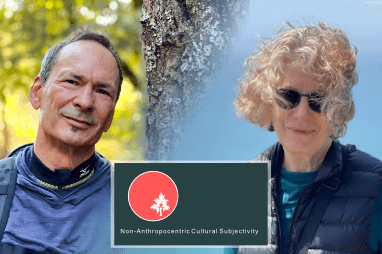“Ecopoetological Laboratory” lectures

20 05 2021
You are welcome to two online lectures as part of the research project “Non-Anthropocentric Cultural Subjectivity” (Activity I.3.12), which will take place on 31 May and 7 June 2021.
Interdisciplinary Ecopoetological Laboratory is conceived as a series of encounters with outstanding poets, artists and scholars whose creative and/or artistic activities engage the problematics of ecopoetics, understood broadly as a field of enquiry into human and non-human ways of worldmaking in the Anthropocene.
- 31 May 2021: Lynn Keller „Meditations in an emergency: Poetry of the Self-Conscious Anthropocene”
Lynn Keller’s research interests include post-war American poetry, experimental poetics of recent decades as well as ecocriticism. Much of her work has focused on innovative writing by women. Her published books include: Forms of Expansion: Recent Long Poems by Women (University of Chicago Press, 1997), Thinking Poetry: Readings in Contemporary Women’s Exploratory Poetics (University of Iowa Press, 2010) and Recomposing Ecopoetics: North American Poetry of the Self-Conscious Anthropocene (University of Virginia Press, 2018). She declares: „While linguistically innovative work has been at the center of my research, I am committed to reading broadly in the field of contemporary poetry and to cultivating in my students the varied reading skills necessary to appreciate varied poetics.” In recent years, combining her interest in experimental poetry with her engagement in environmental issues, Keller has contributed significantly to the development of ecopoetics. Lynn Keller is a professor of poetry and environmental humanities at the University of Wisconsin-Madison.
- 7 June 2021 r: Forrest Gander „Poetry reading”
The work of Forrest Gander, poet, novelist, translator, and essayist, combines erudition and scientific knowledge – Gander has a background in geology – with unfettered linguistic invention and a bold, empathetic imagination. Gander develops a groundbreaking model of ecopoetics, practicing poetry as one practices meditation. For him, poetry is a way of listening to the world, both human and non-human. Gander’s poems, which often refer to non-European poetic traditions, for example Japanese haibun or Sangam literature from southern India, seek new metaphors and new forms of knowledge. By placing landscape at the centre of attention, they articulate a new, non-anthropocentric ontology.